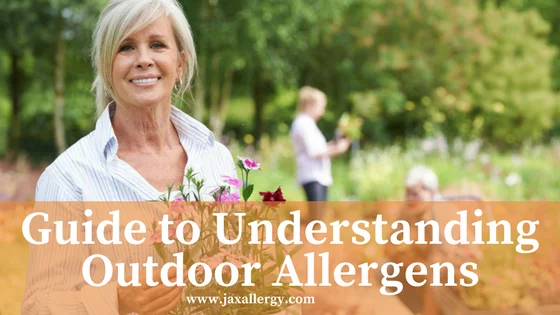Understanding Outdoor Allergens

How can floating particles in the air cause such unfavorable allergic reactions? Outdoor allergens can lead to hay fever and a range of allergy symptoms. These symptoms often including runny nose, sneezing, congestion, and itching of the eyes, ears, nose, throat, and roof of the mouth. The causes of these reactions are typically from mold spores or pollen in the air.
Your body’s immune system controls how it defends itself. If you are allergic to pollen, your immune system thinks pollen is an invader and overreacts by producing antibodies known as Immunoglobulin E (IgE). When these antibodies travel to cells that release chemical, an allergic reaction occurs.
Don’t let outdoor allergies get the best of you. Get to know the two most common outdoor allergens and how to avoid them.
Mold Spores
Mold spores can exist almost anywhere and even float in the air. Molds are tiny fungi similar to mushrooms but without roots, stems, or leaves. Outdoor mold spores increase when temperatures rise in the spring. In the United States, outdoor molds peak in July in warmer states and October in colder states. Mold is present in the South and on the West Coast year-round.
Tips to Avoid Exposure to Outdoor Mold Spores
- Avoid going outdoors on rainy or windy days when mold may be in the air.
- Keep rain gutters and drains clear of leaves and debris. Make sure downspouts flow water away from the house.
- Avoid yard activities or wear a mask when mowing the lawn, raking leaves, or gardening with compost.
- Keep excess leaves, compost, and grass away from areas near your home.
Plant Pollen
Pollen are tiny particles that fertilize plants. Many plants have flowers that produce powdery pollen which can be easily spread by the wind. Colorful flowers such as roses rarely cause allergies and rely on insects to transport pollen for fertilization.
Plants that release pollen have a specific period of pollination during the year and weather can affect the amount of pollen in the air. Seasonal allergic rhinitis is typically caused by tree pollen in early spring. Grass pollen can cause allergy symptoms in late spring and early summer. Hay fever is caused by weed pollen in late summer. In warmer areas, pollen can be present year-round.
Tips to Avoid Exposure to Outdoor Pollen
- Stay indoors when pollen counts are high. Keep an eye on local pollen reports or download a weather app for daily pollen counts in your area. Pollen counts are typically lowest just after sunrise and highest in the afternoon.
- Mow your lawn often, and if possible, have a family member or friend do it for you. If you must mow, use antihistamines before you mow and wear a dust mask.
- Keep the windows and doors of your house or car closed all day. Use air conditioning to avoid pollen coming inside.
- Vacation during peak pollen season to a location where the plants you are allergic to don’t grow.
Treatment for Outdoor Allergens
If outdoor allergies continue to be a struggle, see an allergist for relief from seasonal symptoms. An allergist can determine which allergens, if any, are causing your symptoms and develop a treatment plan to help you feel better. Your personalized plan may include ways to avoid an allergen and medications for temporary relief.
If symptoms persist, your allergist may recommend allergy shots (immunotherapy). This involves regular injections with gradual increases in doses. The process helps your immune system become more resistant to an allergen and lessen symptoms over time.
Are you suffering from outdoor allergens? Call the specialists at the Allergy & Asthma Specialists of North Florida to make an appointment for allergy testing and treatment today.
